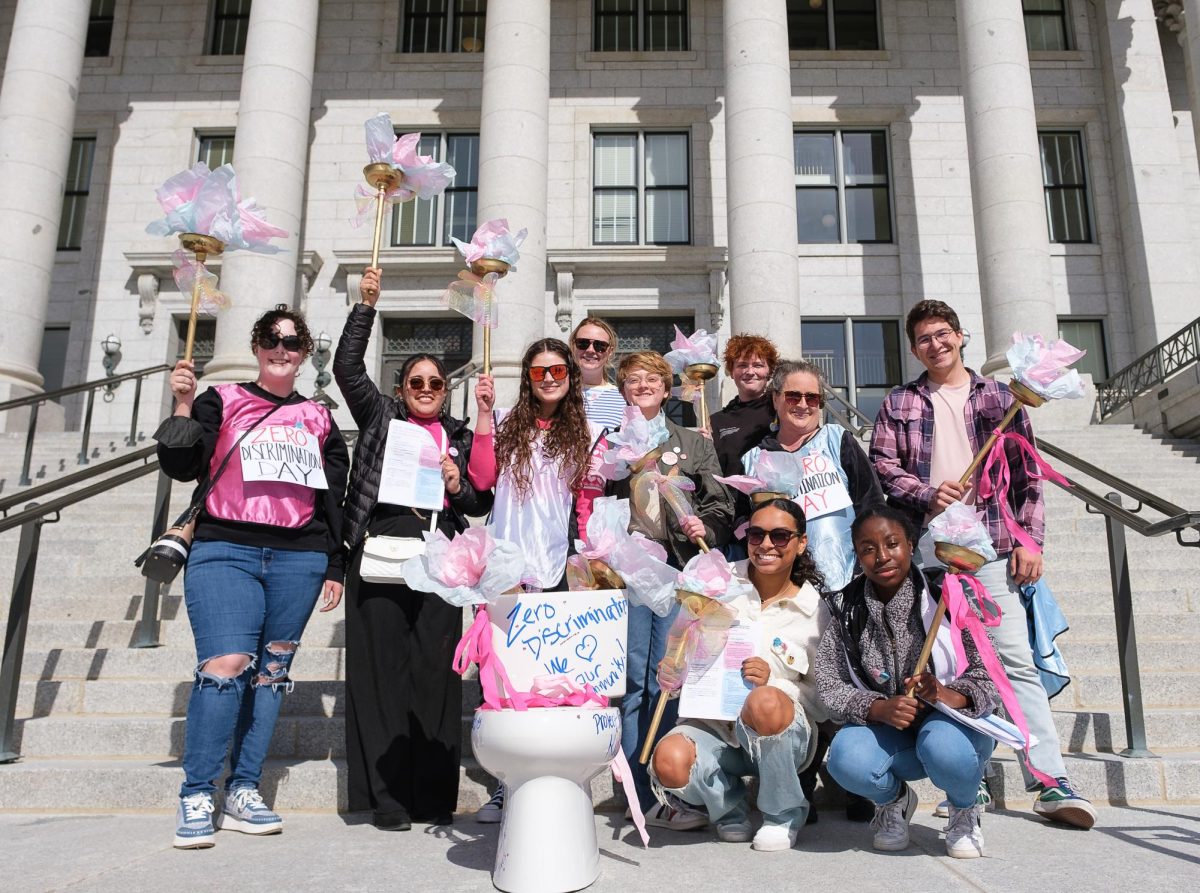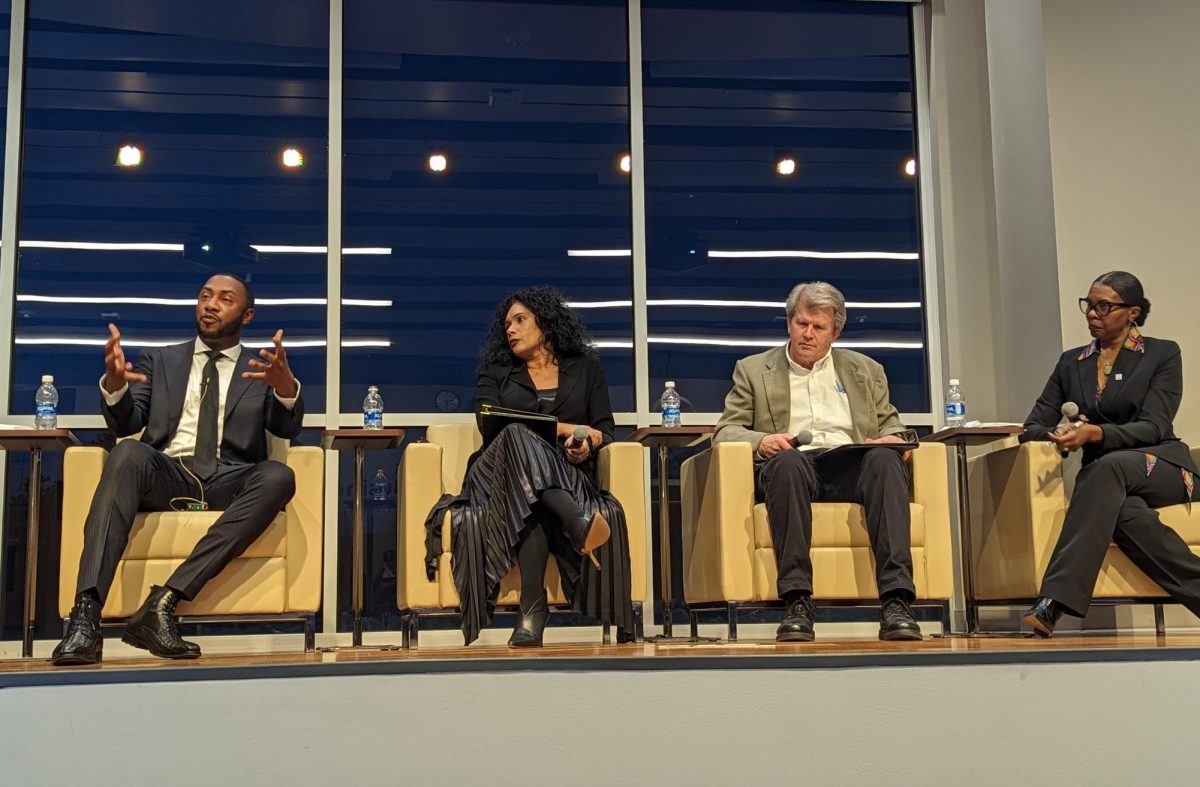
He had one month left until graduation when the threats began.
And it didn’t start slow either. No, this was an onslaught. Around three in the afternoon on Tuesday, April 8, against a backdrop of missed phone calls from local media stations looking for comment, the threats were pouring in on Twitter, Facebook and email accounts by the hundreds.
Some called him a “pansie.” Others told him to transfer schools. And a few threatened to beat him up or kill him.
This was the all-too-real nightmare to which Sam Ortiz woke up during his final weeks at the U.
“There was definitely a point where it was getting really overwhelming,” he said.
And while Ortiz didn’t see this violence coming, he also didn’t see it as a reason to surrender.
Fanning the Flames
What fueled the fire actually began in March, Ortiz said. ASUU drafted a resolution advising the U to examine the “Utah Man” fight song. Ortiz said he spearheaded the effort after a number of people brought concerns to him that the lyrics were sexist and racist.
Having run for office on a platform of inclusivity and diversity, Ortiz didn’t feel he could ignore the pleas. However, there were no initial requests, he said, to change any specific wording in the lyrics.
But that quickly changed after Ortiz received advice from a trusted professor, who told him to be more direct with the administration in his proposal. Edits were made before the resolution passed in an ASUU vote, 21-15 in the Assembly and 7-3 in the Senate, on April 22 — the last day of Ortiz’s term as student body president.
“I had the sense that if I didn’t do it, it just wasn’t going to be done,” he said.
Ortiz regrets waiting so late to initiate the change, hoping more time could have meant more respectful dialogue on the topic, but he admits that still might not have happened.
“I don’t think there’s anything that I could have done to mitigate the reaction,” Ortiz said. “I’m not sure that any other options are out there that would have made this position any easier.”
After the ASUU vote, the measure was then passed on to an eight-member panel instated by U President David Pershing to review possible changes to the song.
Barb Snyder, vice president of Student Affairs, headed the panel of students, faculty and alumni. After reviewing more than 1,000 emails regarding the fight song, the group proposed three changes to the lyrics, with the most contentious replacing “Utah man” with “Utah man/fan.”
Snyder said this compromise was meant to appease both sides of the “very passionate” issue, allowing people to sing the version of the song they prefer.
The panel tossed around other options to replace the word “man,” including scholar, athlete and chemist. They settled on “fan” as the more “logical” option because it rhymed with the original lyrics. Snyder said at one point they considered a fill-in-the-blank version of the song.
The group also suggested switching the line “our coeds are the fairest,” which has been interpreted to mean a preference for lighter skin tones, to “our students are the finest.” And the third recommendation revised the lyric “no other gang of college men” to “no rival band of college fans.”
Pershing approved the three changes on July 2 as the official 2014 version of the song.
Insults Instead of Dialogue
During the three months the fight song was under consideration, from the end of March to the beginning of July, Ortiz hoped to foster civil discussion on the issue. He was met, however, with a reaction he didn’t anticipate.
Students lashed out at Ortiz, attacking him online through his Facebook account and ASUU’s Twitter, for leading the initiative. Members of the community and alumni also sent negative and violent emails to his ASUU account and to the U.
“Words like ‘beating up’ were common, or there was a mean post about having the desire to kill the person responsible for leading the change,” he said.
Several of the attacks Ortiz remembers vividly were “mocking my background as a person of color and as a Latino.” And more, he said, called out his friends who supported the changes and his co-workers in ASUU about their sexual orientation.
One friend, who Ortiz said would like to remain anonymous as a result of the personal attacks, was “severely harassed.” Ortiz said the person’s pictures were downloaded off of Facebook and photoshopped to make fun of them.
“I did not expect the backlash, merely because I thought it was just a song,” Ortiz said. “What just really caught me off guard was the sheer number of negative comments directed my way.”
Someone also created a fake Twitter account under Ortiz’s name with the handle @SamOrtizASUU. He’s not sure who made the account or why.
Because all of the violent comments were made online, Ortiz said he never felt like he was in any immediate danger, but he remarked, “It’s always troubling to hear those kinds of things directed at yourself.”
During the review process, Snyder’s team read more than 1,000 emails sent to the U regarding the fight song. A handful directly called out Ortiz as an “embarrassment,” “ridiculous” and trying to push “his own legacy and agenda.”
The Daily Utah Chronicle received copies of the emails sent to the U in a records request, but were not granted access to the emails sent to Ortiz’s ASUU account. The names of current students were blocked for privacy.
An email from Michael Muehle states, “I believe that Sam Ortiz has manufactured this controversy and in my mind has attempted to embarrass our great University.”
Another email sent by Alex Stark reads, “Sam Ortiz never made this plan of his known when he ran or he would have lost handily.”
And Mark A. Sargent, writing directly to Pershing, said, “I do believe that [Ortiz] mistakenly believes himself a pioneer, a trailblazer, making a bold stroke with his pen for the downtrodden. He does so under false pretenses.”
While the majority of the emails were in favor of retaining the “Utah man” lyrics, Snyder said most were also courteous. She is “disappointed” by the letters sent to the U that directly criticized Ortiz and others.
“I think it’s extremely unfortunate that anyone in our community would attack a student leader for trying to do what he believed he was elected to do,” Snyder said.
Ryan Randall, assistant dean in the Dean of Students Office, advised Ortiz on how to handle the threats. He told him to keep records of the attacks, how to respond and what resources to talk to on campus.
Randall encourages students to share their opinions but warns it’s easy to get carried away.
“I think where it crosses the line is if students are singled out,” he said. “Or if direct threats or harassment is targeted towards a person.”
Still Not a Fan
Ortiz, ironically, is not a fan of the new lyrics. It’s something, he says, he struggles with.
When he transferred to the U in 2012 to study social work, Ortiz remembers singing the fight song at games and feeling “uncomfortable” with the lyrics.
“The fight song is really just a symptom,” Ortiz said. “It became apparent that the song represented the much larger issue of how the university adjusts over time, how we address not just our traditions, but policies that may make our institution less comfortable or friendly toward those who belong to minority populations.”
He feels the compromise over the lyrics ultimately valued tradition above inclusivity.
“I think it would have sent a strong message had they released the new version and just encouraged people to sing the new version,” he said. “I think we just really missed out on that opportunity.”
Now that the issue is resolved, Ortiz hopes the new ASUU administration will continue to lead initiatives on diversity and inclusivity, even when “it’s hard and it’s unpopular” and “just easy to stop talking about it.”
During his term as ASUU president, Ortiz worked on another initiative to prevent bias, called the Bias Incident Response Team, but didn’t have time to finish all aspects he hoped to include in the project. He said the only way something like this will see completion is if the next ASUU leaders support it.
Justin Spangler, Ortiz’s successor as the new ASUU president, has sung the “Utah Man” fight song since he was five years old. And while he plans to foster discussions of diversity on campus, he doesn’t plan to sing the new lyrics.
“I can sing it the way I love,” he said. “But then the person right next to me, if they’re singing another way, that’s completely fine with me.”
Spangler didn’t mention plans to further Ortiz’s work on the Bias Incident Response Team, but he hopes to talk to student groups about inclusivity, while holding steadfast to the song he grew up with.
New Traditions
The “Utah Man” fight song has ties to an 1885 fraternity song with a previous line reading, “we drink our stein of lager and we smoke our big cigars.” That original lyric was changed in 1942 to “our coeds are the fairest, each one’s a shining star” and changed again in the 2014 version to “our students are the finest.”
These changes, Ortiz said, show the fight song has been revised in the past and may be revised in the future, despite students saying the new lyrics break tradition.
“Without a doubt, I understand the importance of tradition,” he said. “But at no point have I ever felt that traditions don’t change or shouldn’t change because they very obviously do change.”
Ashley Jolin, who graduates from the U this summer in political science and English, started a Facebook page titled “A Utah INCLUSIVE FAN Am I,” that now has nearly 400 “likes,” for those supporting new traditions with the fight song. She created the space in early April after seeing violent threats posted online.
“I realized that if people were resorting to personal attacks as opposed to positive dialogue,” Jolin said, “this issue was big, and it was reflective of the fact that our society and university community has a long way to go in general.”
Jolin did not associate her name with the page initially for “neutrality,” but feels if she had been more in the limelight she might have been treated similar to Ortiz.
“Had I been more in the public eye, I have no doubt I would have been threatened in some manifestation,” she said.
Ortiz said seeing others being attacked was the worst part of the “Utah man” controversy for him, but the violence only affirmed for Ortiz the need to change the lyrics. Although he wishes no threats were made in the dialogue, he ssaid the fight he put into the fight song was worth it.
In the fall, Ortiz will be a master’s student in higher education at Columbia University. He hopes to work with underprivileged individuals more in his future work.
“At the end of the day, I had an opportunity to represent and speak out on those who don’t ever get represented,” Ortiz said. “And I chose to do that.”
[email protected]
@CourtneyLTanner
Write for Us
Want your voice to be heard? Submit a letter to the editor, send us an op-ed pitch or check out our open positions for the chance to be published by the Daily Utah Chronicle.
@TheChrony
Print Issues
Write for Us
Want your voice to be heard? Submit a letter to the editor, send us an op-ed pitch or check out our open positions for the chance to be published by the Daily Utah Chronicle.
@TheChrony
A Utah Sam am I
August 1, 2014
Leave a Comment






















